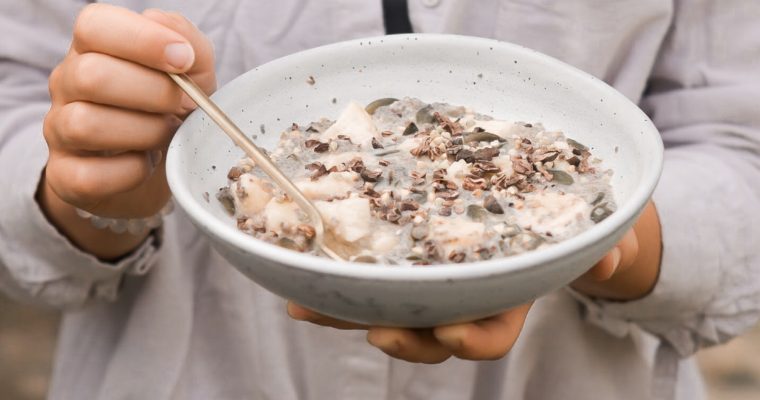SHARE
As a Holistic Nutritionist, I often come across clients who struggle with digestion. When we get to analyzing their diet and everyday habits, I begin to notice a trend – some of the things they are doing on the daily is seriously wreaking havoc on their digestion! Find out what not to eat and how to heal digestive problems below.
Is aquafaba bad for digestion?
Aquafaba is all the rage in 2019, featured in vegan baking and healthy hacks for sweet treats. What is aquafaba, you may ask? Aquafaba is the brine that’s leftover from cooking legumes, or the liquid leftover in a can of chickpeas. This substance contains something called “phytic acid”, which is tough for our bodies to digest, often causing bloat and digestive problems. Although aquafaba can make a wonderful egg-like replacement for mayo, merengue, and other delicious treats, I don’t recommend consuming this ingredient when it comes to digestion. So if you’re looking for heal digestive problems, I would recommend avoiding all products containing aquafaba (usually found in trendy vegan foods).
Is too many probiotics a bad thing?
Although I am a huge fan of getting in my daily probiotics for gut health, having too many probiotics can also be a thing! If you want to heal digestive problems, taking a look at your probiotic intake might be a good thing.
Have you ever sipped on a bottle of kombucha, thinking it would be great for digestion, only to find yourself bloated and gassy afterwards? Confusing, right?
5 years ago I attended a probiotics workshop. I was new to probiotic-rich foods and hadn’t yet introduced them to my diet. I went a little overboard and indulged in copious amounts of fermented cashew cheese, sauerkraut and kombucha. Needless to say, my body did not react well to a huge colony of new bacteria in my gut. Too much of a good thing can be harmful – I felt awful for weeks.
So what are probiotics?
Probiotics are little healthy bacteria that create something called your “microbiome” that essentially work within your body (mainly your large intestine) to support your immune system, mood, hormones and so much more. You can get a healthy gut microbiome by consuming probiotic-rich foods and eating a variety of healthy plant foods to feed those probiotics.
Our (very important!) microbiome is designed naturally from birth – unfortunately, over years, our gut flora can deteriorate or be taken over by unhealthy bacteria from harsh chemicals, poor diet, antibiotics and more. I always recommend to my clients that eating a small amount of probiotics daily can contribute to overall health and wellbeing, but it’s important to take it slow for beginners.
Nutritionist-backed tip: Try incorporating small amounts of probiotics daily, but don’t overdo it. Try one of the following each day:
- 1 tbsp raw, refrigerated (not shelf stable) sauerkraut with lunch
- 2 tbsp. quality full-fat organic
yoghurt (I recommend coconut) with breakfast - 1/4 cup of quality kombucha in place of a glass of wine or soda
- 1 tbsp raw, refrigerated fermented miso paste in a dinner soup
When it comes to probiotics, the best thing to do would be to listen to your body – you know your body best and 1 serving of fermented foods may feel different to another person’s ideal serving. You do you!
Can watermelon cause bloating?
To many people’s surprise, did you know that melon digests way faster than any other food? Melons (honeydew, watermelon, etc.) are wonderful foods that are especially abundant during summertime (hello backyard BBQ dessert!) and in smoothies. I used to munch on watermelon after dinner all the time, only to find myself feeling bloated and gassy afterwards.
Ever munched on some watermelon for dessert after a meal, only to find yourself bloated after? This is because watermelon digests in 30 minutes, versus other foods which take 40 minutes-24 hours to digest. So watermelon is best to consume before a meal or in between meals on an empty stomach.
Surprised? I was too! If you feel fine eating watermelon, don’t stress! Some people have a more sensitive digestive system than others, and watermelon is packed with minerals and goodness. If you want to enjoy a fruit after dinner, try pineapple as it contains an effective digestive enzyme called bromelain.
Is cow or goat’s milk healthier?
Did you know that goat’s and sheep’s milk is easier to digest than cow’s milk?
Since over 75% of the world’s population is lactose intolerant, it’s no wonder many of us experience digestive problems when it comes to dairy. Combined with raising the animals in poor conditions and overconsumption, over-processed cow’s dairy has essentially become nutrient-depleted and no longer necessary in a healthy diet. However, if you do choose to consume dairy, there are a few alternative ways to feel physically better while doing it! Here’s how:
- Stick to goat or sheep dairy products, which contain less lactose
- Stick to
yoghurt , kefir, aged cheese or feta for easier digestion as these contain naturally occurring probiotics to help digest the food - Rethink dairy: dairy is something that, if at all, should be enjoyed in small amounts. Try including a tbsp a day, but avoid over-doing it to make sure your tummy is happy!
The bottom line: food should make us feel good! If certain foods don’t make you feel good or are linked to poor digestion, it might be best to take a look at your diet or work with a holistic healthcare professional, such as a Holistic Nutritionist or Naturopathic Doctor, to heal digestive problems. Remember to take everything with a grain of salt and remember that you know your body best! Feel free to use my RHN-backed information as a guide to create the ideal diet and lifestyle for you as an individual.
XO,
Sisley
Sources Used

Informative content – we always need good gut health information and reminders!